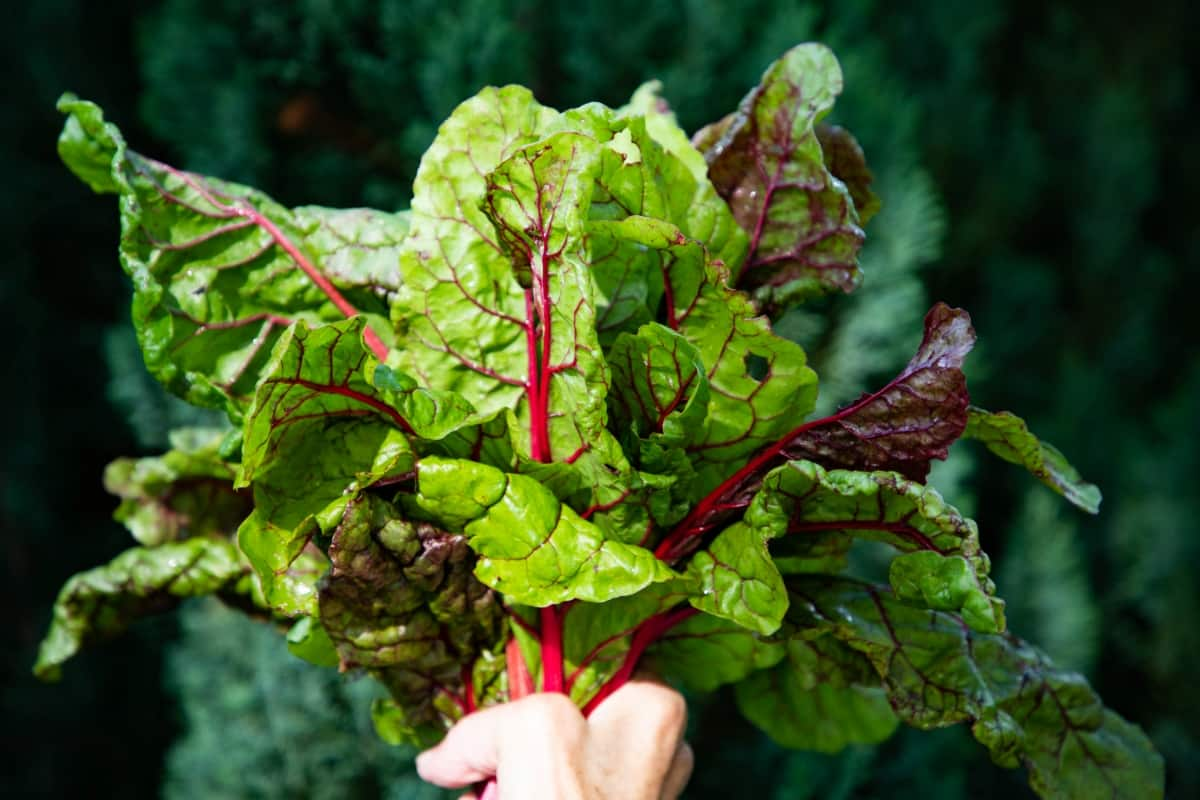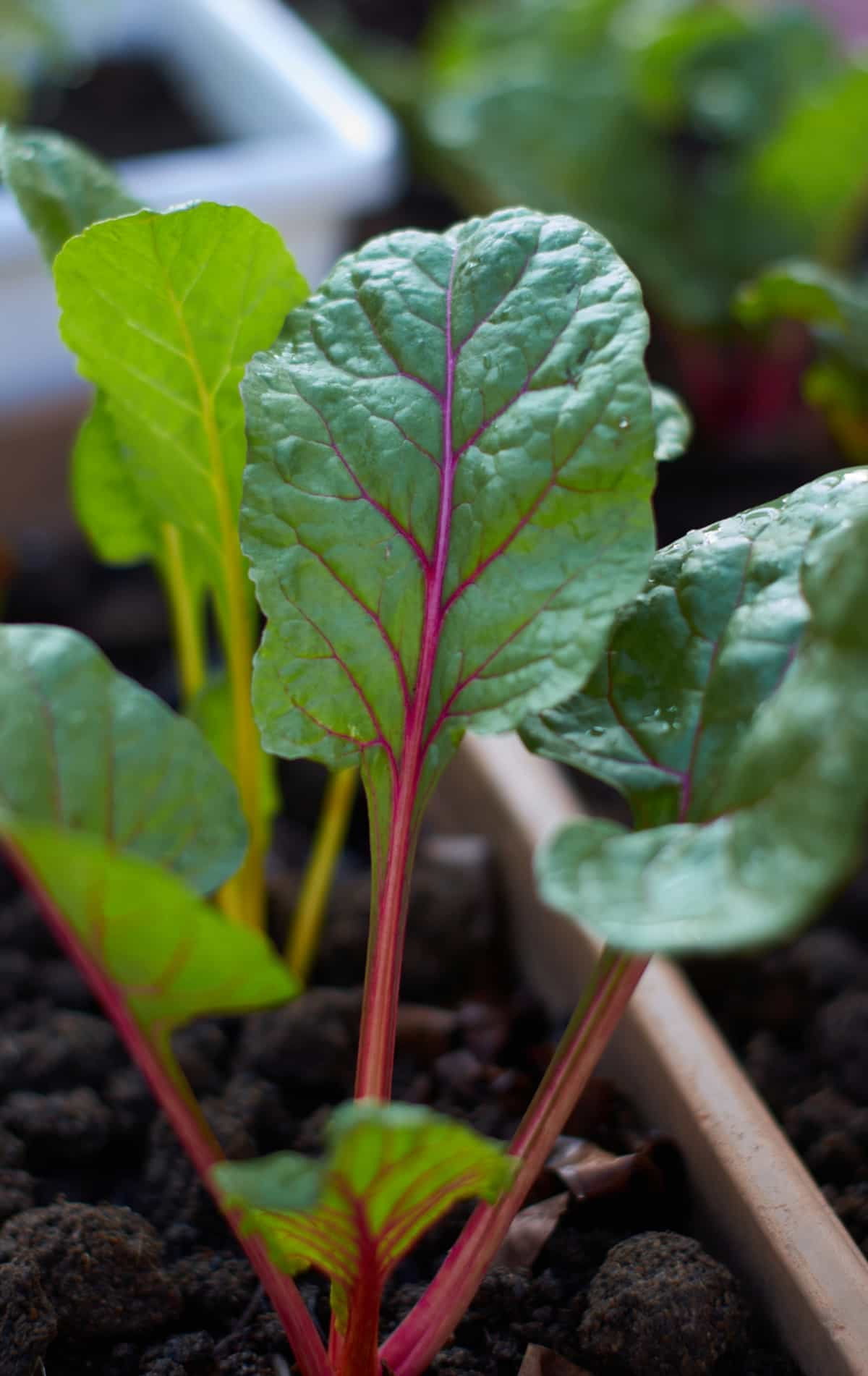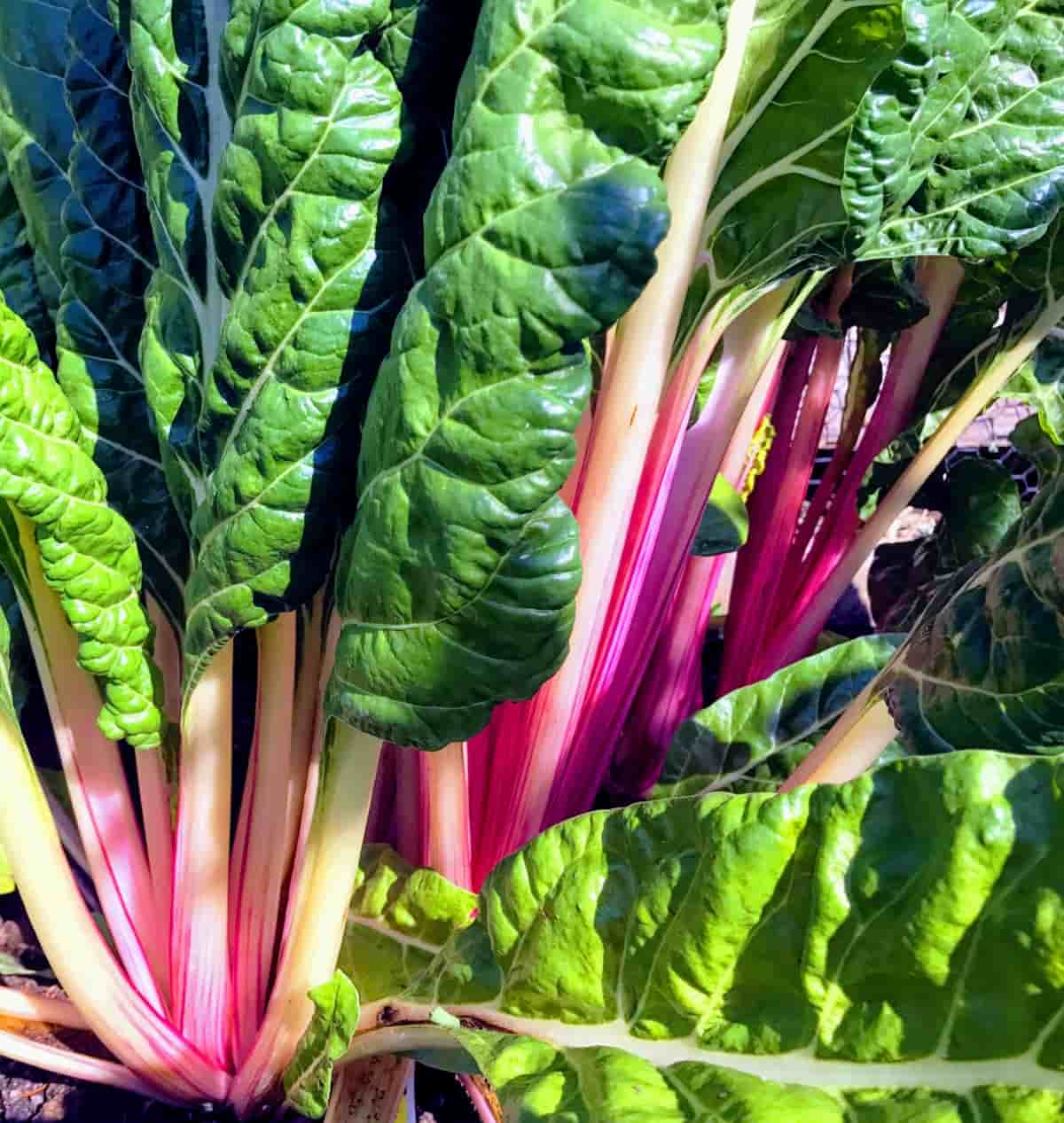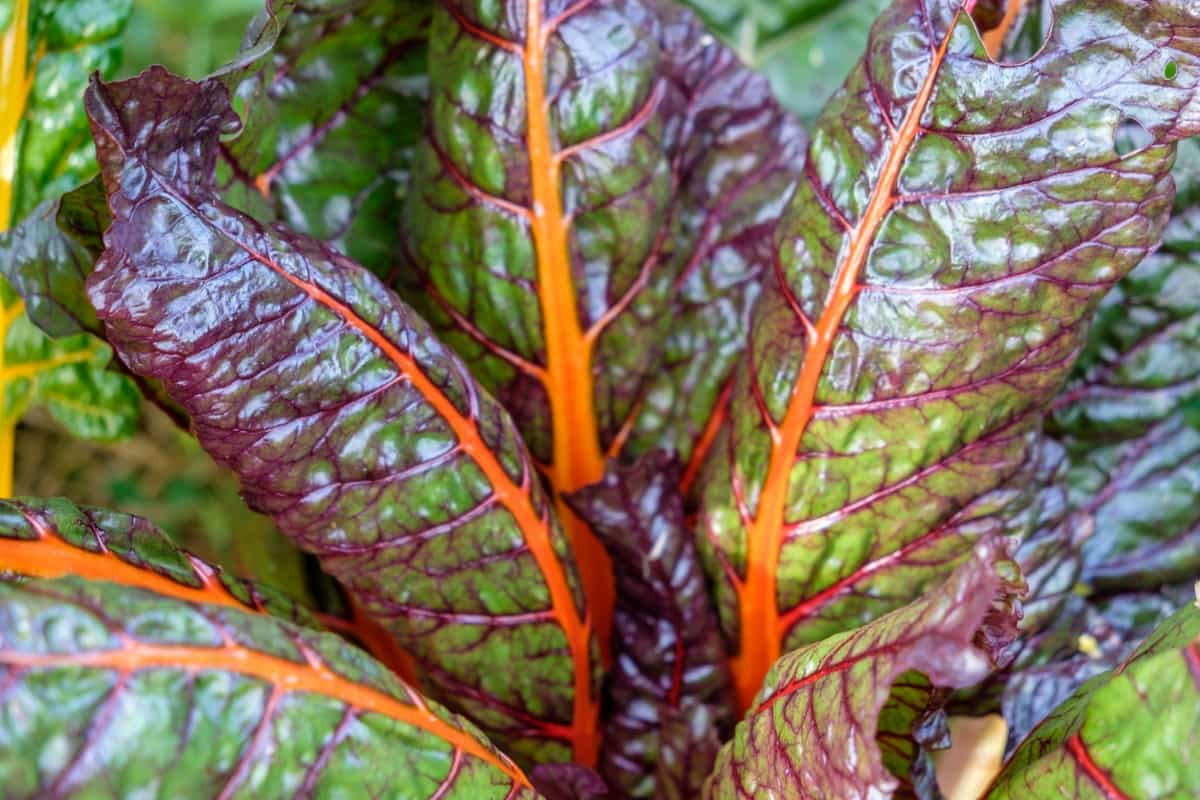Finding the best fertilizer for Swiss Chard plants in pots ultimately depends on your preferences and gardening goals. Consider factors such as environmental impact, ease of use, cost-effectiveness, and desired outcomes when deciding. Always follow package instructions for proper application rates and timings to avoid harming your plants with excessive fertilizer usage.

Experimenting with different fertilizers may be necessary to find what works best for you and your plants’ requirements. Always monitor your plants closely and adjust accordingly based on their response. By providing adequate nutrition through appropriate fertilization practices, you’ll ensure healthy Swiss Chard plants bursting with vibrant leaves ready for harvesting.
Best Fertilizers for Swiss Chard Plants in Pots
Organic Slow-Release Fertilizer for Swiss Chard Plants in Pots
Organic slow-release fertilizers are made from natural ingredients such as composted manure, bone meal, fish emulsion, and other plant-based materials. They feed your Swiss Chard plants, improve soil health, and promote beneficial microbial activity. The slow-release nature of these fertilizers means that you don’t have to worry about applying them frequently.
Incorporate the recommended amount into the potting mix when planting or top-dress around the base of established plants. The nutrients will gradually break down and become available to your Swiss Chard over several weeks or months. This method ensures a constant supply of nutrients without risking over-fertilization or nutrient burn.
Liquid Seaweed Fertilizer for Potted Swiss Chard Plants
If you’re looking for a natural and effective fertilizer for your potted Swiss Chard plants, look no further than liquid seaweed fertilizer. This nutrient-rich concoction is derived from seaweed and packed with essential minerals and trace elements to promote healthy plant growth. One of the great benefits of using liquid seaweed fertilizer is its ability to enhance root development.
The hormones present in seaweed stimulate root growth, allowing your Swiss Chard to establish a strong foundation in their pots. Additionally, liquid seaweed fertilizer has been found to improve overall plant vigor and resistance to pests and diseases. Another advantage of liquid seaweed fertilizer is its high content of micronutrients like iron, zinc, magnesium, and manganese.
These nutrients are crucial for various metabolic processes within the plant, ensuring optimal health and productivity. Applying liquid seaweed fertilizer is easy too. Just dilute it according to the instructions on the bottle and water your Swiss Chard plants regularly with this mixture. You can also use it as a foliar spray by misting the leaves lightly.
Best Natural Fertilizer for Container-Grown Swiss Chard
One of the best natural fertilizers for Swiss Chard is compost. Compost contains organic matter and nutrients that promote healthy plant growth. You can make your compost using kitchen scraps, yard waste, and other organic materials. Another excellent option is worm castings. Worm castings are an all-natural fertilizer made by earthworms. Fish emulsion is a great choice for container-grown Swiss Chard if you prefer liquid fertilizers. Fish emulsion is made from fermented fish waste and provides a balanced mix of nitrogen, phosphorus, and potassium.
In case you missed it: Best Raised Garden Beds for All Plants: for All Seasons, Small Spaces, and Outdoor Use

Another natural liquid fertilizer for potted Swiss Chard plants is a seaweed extract. Seaweed contains trace minerals that are beneficial for plant growth and helps improve overall plant health. You can nourish your plants while protecting the environment by choosing a natural fertilizer for your container-grown Swiss Chard.
High-Nitrogen Fertilizer for Swiss Chard in Pots
One essential nutrient that Swiss Chard needs is nitrogen. Nitrogen is key in promoting leafy green growth, which is exactly what you want when cultivating this vegetable. Consider using a high-nitrogen fertilizer to give your potted Swiss Chard plants a nitrogen boost. High-nitrogen fertilizers are specifically formulated to provide plants with an ample supply of this vital nutrient. These fertilizers typically contain a higher percentage of nitrogen compared to other nutrients like phosphorus and potassium.
This means they can help stimulate vigorous foliage growth, ensuring your Swiss Chard develops lush leaves packed with flavor and nutrition. Remember to follow the manufacturer’s instructions when applying fertilizer to your Swiss Chard plants. Applying too much nitrogen can cause excessive vegetative growth at the expense of fruit production. Choosing a high-nitrogen fertilizer tailored for container-grown vegetables like Swiss Chard gives your plants the nourishment they need for vibrant green leaves that will make your mouth water.
Phosphorus-Rich Fertilizer for Potted Swiss Chard
Phosphorus, including Swiss Chard, is essential for plants’ healthy growth and development. When it comes to potted Swiss Chard, providing an adequate phosphorus supply is crucial to ensure optimal plant health and productivity. A phosphorus-rich fertilizer can help meet the nutritional needs of your container-grown Swiss Chard. Phosphorus is vital in promoting root development, flowering, and plant fruit set.
It also aids in energy transfer within the plant cells, ultimately improving overall plant vigor. When selecting a phosphorus-rich fertilizer for your potted Swiss Chard, look for one with a higher middle number on its label. The middle number represents the percentage of phosphorous content in the fertilizer formulation. Aim for a balanced NPK ratio or slightly higher phosphorous levels than nitrogen and potassium.
In case you missed it: Best Fertilizers for Eggplant Plants in Pots: Organic, Slow-release, Liquid, and Natural

Applying a phosphorus-rich fertilizer according to package instructions will ensure that your potted Swiss Chard receives an adequate supply of this important nutrient throughout its growing season. Remember to water your plants after fertilization to allow nutrients to reach the roots effectively.
Potassium-Based Fertilizer for Container Swiss Chard
When growing healthy and vibrant Swiss Chard in pots, potassium is an essential nutrient that shouldn’t be overlooked. Potassium is crucial to plants’ overall health and vigor, helping them withstand stress and disease. One excellent potassium-based fertilizer option for container-grown Swiss Chard is wood ash. Wood ash is not only readily available but also rich in potassium content.
It’s a natural byproduct of burning wood and can be easily sprinkled around your potted Swiss Chard plants. Another great source of potassium is banana peels. Before tossing those banana peels into the compost bin, use them as a natural fertilizer. Plenty of potassium-rich fertilizers are available on the market specifically designed for vegetable crops like Swiss Chard if you prefer commercial options.
Balanced NPK Fertilizer for Swiss Chard Plants in Containers
When nourishing your Swiss Chard plants in containers, a balanced NPK fertilizer can work wonders. With the right balance of nitrogen (N), phosphorus (P), and potassium (K), this type of fertilizer provides essential nutrients for healthy growth. The nitrogen component promotes lush foliage and green leaves, while phosphorus supports strong root development and overall plant vigor. Potassium, on the other hand, helps with disease resistance and enhances fruiting or flowering.
A balanced NPK fertilizer for Swiss Chard typically has equal ratios of these three elements, such as 10-10-10 or 14-14-14. This ensures that your Swiss Chard plants receive a well-rounded nutrient boost without any excesses that could lead to imbalances or burn their delicate roots. Applying a balanced NPK fertilizer according to package instructions ensures that your potted Swiss Chard receives consistent nutrition throughout its growing season. Consider factors like container size and water requirements when determining the appropriate plant dosage.
In case you missed it: Bone Meal for Pepper Plants: Benefits, When, and How to Apply?

Slow-Release Granular Fertilizer for Potted Swiss Chard
Slow-release granular fertilizers are a popular choice for potted Swiss Chard plants, providing a steady supply of nutrients over an extended period. These fertilizers contain slow-release nitrogen, phosphorus, and potassium in tiny granules that gradually break down and release nutrients into the soil. One advantage of using slow-release granular fertilizer is its convenience.
With just one application, you can ensure your Swiss Chard plants receive a continuous supply of essential nutrients for several months. This saves you time and effort compared to applying liquid or water-soluble fertilizers more frequently. Another benefit is that slow-release granular fertilizers promote balanced growth in Swiss Chard plants.
They deliver nutrients at a controlled rate, preventing nutrient deficiencies or excesses that can occur with other fertilizers. This helps maintain healthy foliage and promotes strong root development. Additionally, slow-release granular fertilizers are less likely to leach out of the potting soil during watering or heavy rainfall. The granules act as reservoirs for nutrients, releasing them slowly without being washed away by excessive moisture.
Water-Soluble Fertilizer for Container-Grown Swiss Chard
Water-soluble fertilizers are convenient and effective for feeding your container-grown Swiss Chard plants. These fertilizers are easy to use, as they dissolve quickly in water, making them readily available for uptake by the plant’s roots. One of the benefits of water-soluble fertilizers is their ability to provide an immediate nutrient boost to your Swiss Chard plants.
This can be especially beneficial if you notice any signs of nutrient deficiency or slow plant growth. With just a simple dilution in water, you can deliver the necessary nutrients directly to the root system. Another advantage of using water-soluble fertilizers is that they allow precise control over nutrient levels.
In case you missed it: How to Prevent Cilantro Bolting: 8 Causes and Solutions

By following the instructions on the fertilizer package, you can ensure that your Swiss Chard plants receive the appropriate amount of nutrients without risking over-fertilization. Water-soluble fertilizers are versatile and can be used throughout the growing season. You can adjust the frequency and concentration of application based on your plant’s needs at different stages of growth.
Best Organic Fertilizer Blend for Container Swiss Chard
Organic fertilizers are popular for gardeners looking to provide their plants with the nutrients they need without synthetic chemicals. When growing Swiss Chard in containers, finding the best organic fertilizer blend can make all the difference in ensuring healthy and productive plants. One option is a balanced organic fertilizer blend that contains essential nutrients like nitrogen, phosphorus, and potassium.
These macronutrients are crucial for plant growth and development, helping Swiss Chard thrive throughout its lifespan. Swiss Chard may require these micronutrients in smaller quantities, but they are still essential for optimal growth. Look for blends that include iron, boron, manganese, zinc, and copper to ensure your plants have access to these vital elements. In addition to macro- and micronutrients, some organic fertilizer blends contain beneficial bacteria and fungi.
These organisms help improve soil health by separating organic matter into forms that plants’ roots can easily absorb. This can result in increased nutrient availability and overall plant vigor. When choosing an organic fertilizer for container Swiss Chard, selecting one specifically formulated for vegetables or leafy greens is important. This will ensure that the nutrient ratios are appropriate for this particular crop.
Microbial-Based Fertilizer for Swiss Chard Plants in Pots
Microbial-based fertilizers are gaining popularity among gardeners who want to cultivate Swiss Chard plants in pots. These fertilizers contain beneficial microorganisms that work symbiotically with the plant roots, promoting nutrient uptake and overall plant health. The key advantage of microbial-based fertilizers is their ability to enhance soil fertility naturally.
The microorganisms in these fertilizers help break down organic matter into nutrients readily available for Swiss Chard plants. This not only improves the nutrient content of the soil but also increases its water-holding capacity. Moreover, microbial-based fertilizers aid in disease prevention by suppressing harmful pathogens and stimulating the growth of beneficial microbes.
This creates a balanced and resilient ecosystem within the potting mix, ensuring healthy Swiss Chard plants throughout their growth cycle. Another benefit of using microbial-based fertilizer is its eco-friendly nature. These products are typically made from natural sources like compost or worm castings, making them safe for humans and the environment.
Calcium-Rich Fertilizer for Potted Swiss Chard Plants
One essential nutrient that is often overlooked when it comes to fertilizing potted plants is calcium. However, providing your Swiss Chard plants with a calcium-rich fertilizer can greatly benefit their growth and overall health. Calcium plays a key role in developing strong cell walls, which helps prevent diseases and improve the plant’s ability to absorb other nutrients. It also aids in root development and enhances the plant’s tolerance to stressors such as heat or cold.
To ensure your potted Swiss Chard gets an adequate supply of calcium, consider using a fertilizer specifically formulated for this purpose. Look for products containing readily available calcium sources, such as gypsum or dolomite lime. Applying the fertilizer according to the package instructions will help give your plants the calcium they need for optimal growth.
In case you missed it: How to Prevent Broccoli Bolting: Causes, Identification, Remedies, and How to Fix

Regular applications throughout the growing season will ensure consistent access to this vital nutrient. Remember that while calcium is important, it should be used with other necessary nutrients. A balanced approach using different fertilizers will provide your potted Swiss Chard plants with all they need for healthy and abundant harvests.
Conclusion
Remember that choosing the right fertilizer is just one piece of the puzzle for growing thriving Swiss Chard plants in pots. Proper watering techniques, adequate sunlight exposure, and regular pruning of damaged leaves or stems ensure optimal growth. By understanding the specific nutritional needs of Swiss Chard plants and selecting suitable fertilizers– whether organic or synthetic – you’ll be well on your way toward cultivating healthy plants that produce vibrant leaves packed with flavor and nutrition.
- How to Grow Tomatoes Organically at Home: A Comprehensive Guide
- Organic Gardening on a Budget: Low-Cost Methods and Materials
- Gongura Seed Germination and Planting Methods
- Cabbage Seed Germination and Selection
- Broccoli Seed Germination and Selection
- Asparagus Seed Germination and Variety Selection
- Seasonal Flower Gardening: Best Practices for Spring, Summer, Fall, and Winter
- How to Grow Hibiscus from Flower
- Plantation Ideas for Home Decoration: A Beginners Guide
- Flower Garden Designs and Layouts for Beginners
- Planting and Spacing Techniques in Papaya: A Beginner’s Guide
- Growing Gold: Essential Techniques for Planting Pineapples
- How to Make Kalanchoe Plant Bushy: Home Remedies and Solutions
- 11 Reasons Why Your Gardenia is Not Blooming: Home Remedies and Solutions
- Eco Elegance: The Guide to Designing a Drought-Tolerant Landscape
- Gardening on a Slope: Strategies for Hillside Landscaping
- Nourish and Flourish: Top Organic Mulches for Thriving House Plants
- Everything You Want to Know about Indian Mogra Flower: Discover Uses and Growing
- Green Thumb Success: Expert Tips for Cultivating Greenhouse Pumpkins All Year Round
- Maximize Growth & Flavor: The Ultimate Guide to Companion Planting in Herb Gardens
- How to Control Rhododendron Problems Naturally: Home Remedies and Organic Ways to Fix Them
- Natural Magic: The Remarkable Benefits of Cinnamon for Plants
- Best Steps to Revive Dying Tulip with Natural and Organic Treatment
- 10 Reasons Why Your Angel Trumpet is Not Blooming: Remedies and Treatment
- How to Fix Periwinkle Leaf and Flower-Related Problems: Natural Remedies and Solutions
- How to Fix Zinnias Leaf and Flower Problems: Discover Natural and Home Remedies
- Organic Steps to Induce Lemon Tree Flowers: A Comprehensive Guide
- Bloom Booster: Crafting the Perfect Homemade Bougainvillea Fertilizer
- Optimizing Growth: A Guide to Applying NPK Fertilizer for Potted Plants
- 10 Best Homemade Fertilizers for Rubber Plant: DIY Recipes and Application Method
- How to Boost Female Pumpkin Flowers: Effective Steps for More Flowers and High Yields
- Transform Your Indoor Garden: Top Benefits of Pink Salt for Houseplants
- 10 Best Homemade Fertilizers for Peacock Plants (Calathea): Easy DIY Guide
- Unlock Blooms: 9 Reasons Why Your Potted Chrysanthemum is Not Blooming
- 8 Reasons Why Your Potted Hibiscus is Not Blooming: Fix it with Simple Solutions
- Unlock Blooms: 9 Key Reasons Your Potted Frangipani Won’t Flower